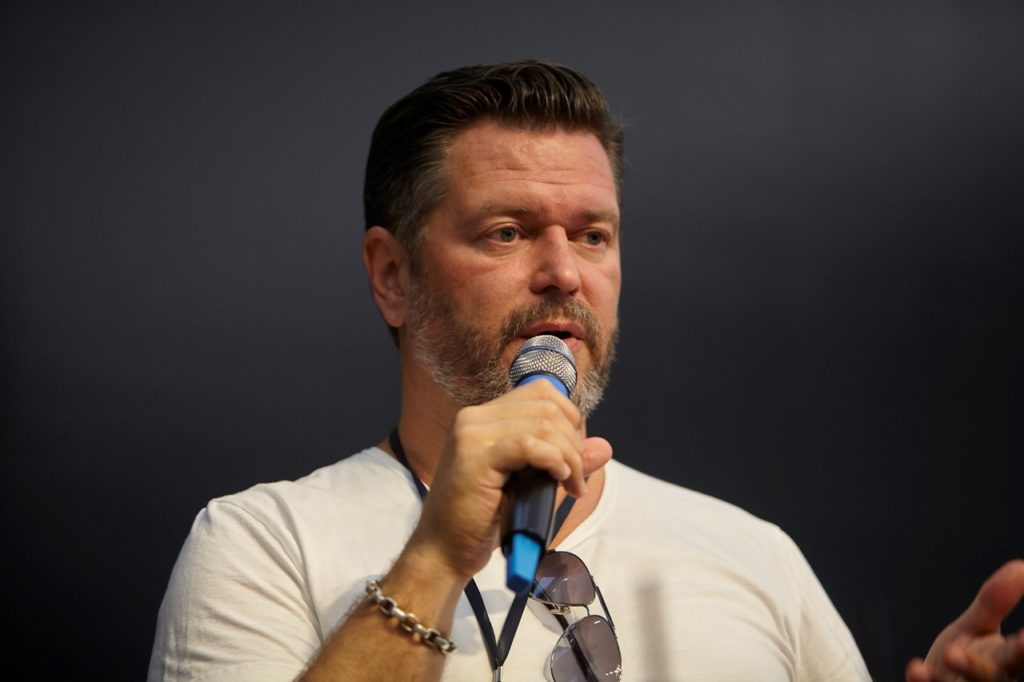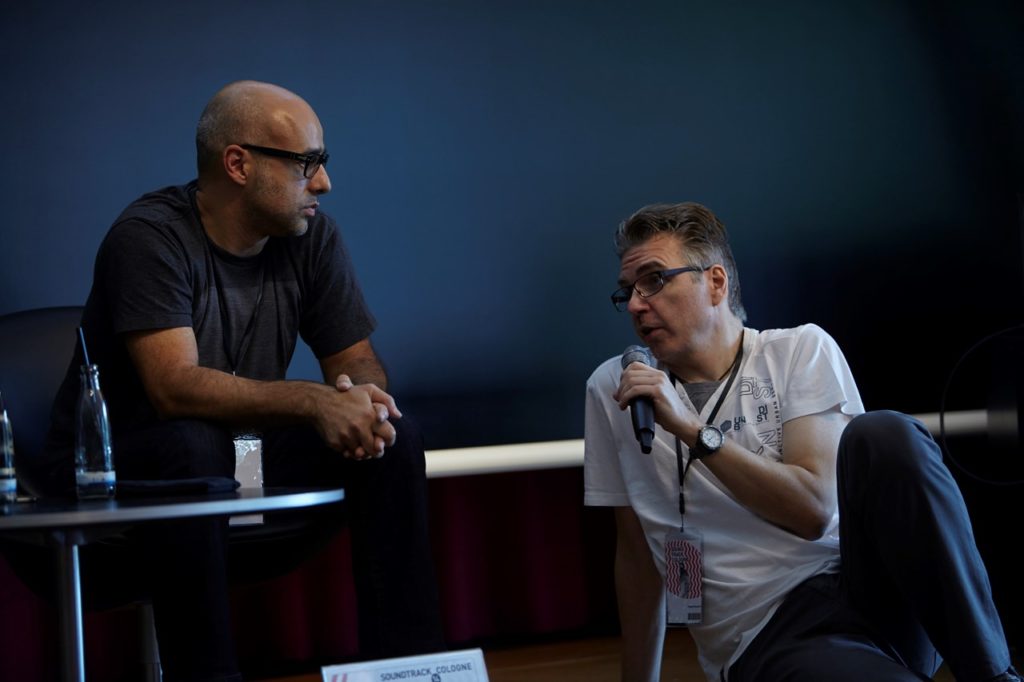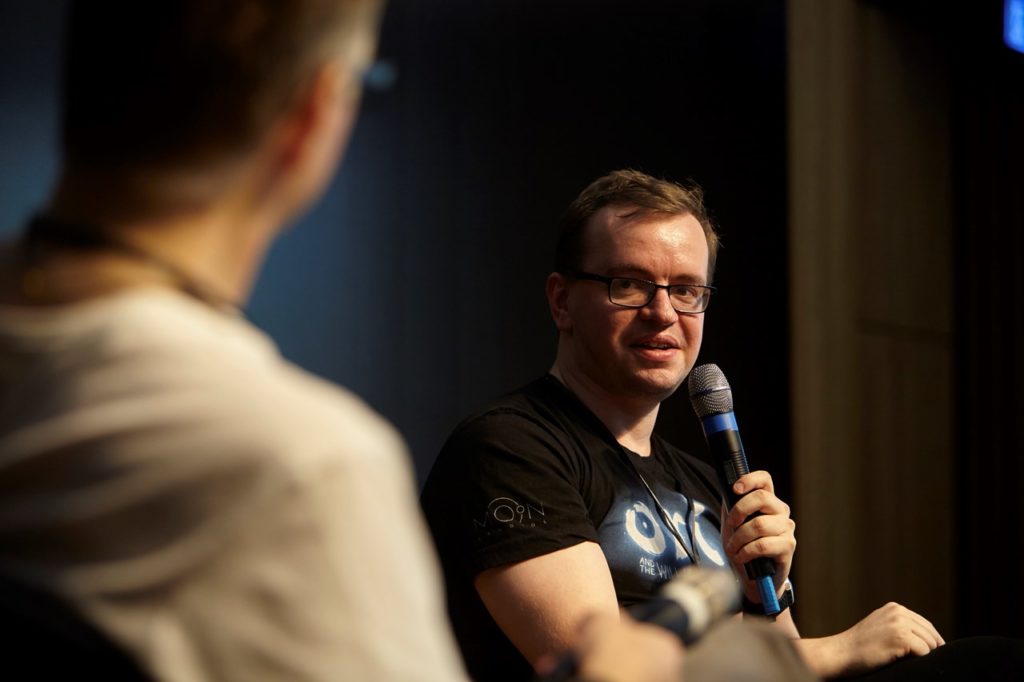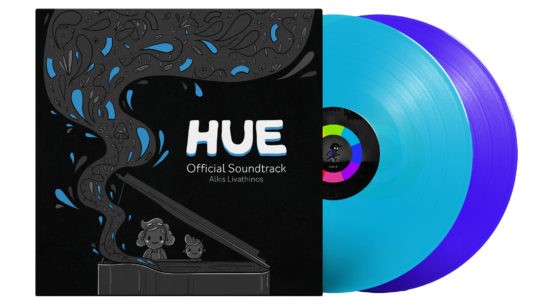
Soundtrack Cologne (or STC for short) is an annual event celebrating and encouraging the creation of music and sound for visual media. Spanning several days, the conference includes talks and workshops with industry professionals, and each day of the conference is dedicated to a specific field of media (film, television, and video games).
Last month, Hazel Turnbull made the trip to Germany to attend some of the conference. Here are her personal highlights from the event!
There’s always a sense of excitement and anticipation on arriving at STC. You know the next few days are going to be crammed full of talks and workshops with leading people in the industry – some of whom have inspired you in your own career. For composers and sound designers alike, it’s a gold mine of learning and networking opportunities; not only from the invited speakers, but also from the exceptionally talented and friendly attendees who are just as excited to be there as you are. As well as attending several of the talks, I was also lucky enough to get interviews with many of the featured composers. These interviews will be coming soon!
Day 1 of STC was video games day – admittedly, the day I was most looking forward to! With composers Petri Alanko, Bobby Tahouri and Gareth Coker all lined up to host talks, it was guaranteed to be both insightful and inspiring: a day of highlights!
First up, and my first highlight of the event, was Petri Alanko. The composer for games Alan Wake and Quantum Break, Alanko’s talk delved into both soundtracks and discussed his creative approaches.
“I like to destroy things.”
Alanko’s talk was absolutely fascinating. Confessing that he likes to destroy and dissect things, he noted that “sound design and composing are hand in hand.” One of the first things he does when first starting a new project is to write a main theme or piano score. He then begins experimenting with sounds, which in turn helps him build a sound world for his music. In my interview with Alanko we delved into this in fascinating detail. Fun fact: one of the main themes for Quantum Break may or may not have come from a time-stretched recording of a demolished household object… (Seriously, listen to the interview. #awesome)

I found it particularly interesting that Alanko likes to compose something, then leave it for around two weeks. He says that, if he remembers it after those two weeks, it is worth writing down. He also explained that when he begins a new project he likes to look for “anchors” – elements the music should convey. To do this he likes to read the manuscripts ahead of time and learn about the characters and their relationships, and admitted that he would love to be more involved with the game writers and character designers if time would allow it.
Having listened to Alanko’s music for both Quantum Break and Alan Wake, I think it would be fair to describe him as a musical chameleon with a talent for experimenting with, and blending, orchestral and synthesised sound. If you haven’t heard either soundtrack, I thoroughly recommend listening to them! Incidentally, Alanko also has a new album of music on the way, with release scheduled for October 2017.
Next up, and my second highlight of the conference, is Bobby Tahouri! As the composer for Rise of the Tomb Raider, I was eager to hear about his experiences composing for such a massive and well-known franchise. It was strangely comforting to hear that Tahouri’s first big venture into the world of media composing came from an off-the-cuff email to film composer Geoff Zanelli asking if he needed an assistant – who, Tahouri admits, he picked because he liked the sound of his name. Tahouri explained how he learned a lot from his experiences as Zanelli’s assistant, and that he occasionally got to write additional music for his projects.
“There’s nothing like a deadline to bring inspiration to you.”
From there, Tahouri went on to be assistant and co-composer to Game of Thrones composer Ramin Djawadi. Describing his experiences he revealed that he would frequently get to sit in with Djawadi on spotting sessions.
“I’d always wanted to write music for games.”
The best part of Tahouri’s talk for me (and I imagine many others!) was when he graciously let us hear and see his initial demos and music pitches for Rise of the Tomb Raider. We were first shown the footage as Tahouri had seen and experienced it – absolutely silent. Three clips in total, the first was an early trailer for the game. The other two ‘films’ honestly left me a bit shocked. They were frames of still images and concept art, nothing more. Tahouri explained that as part of his audition for the composer role, he was asked to write music to capture the emotions and locations of the concept images. As a composer myself, I have to admit I watched these still frame videos in a horrified trance, struggling to imagine what *I* would write for them, had I been set the same challenge. How could I create movement, a story, a context, from those disjointed images? Then came a magical moment. Tahouri then replayed those audition videos, but this time with his own, original pitch demos. It’s safe to say I was well and truly blown-away. From a few still frames, with little to connect them, Tahouri had managed to create a cohesive and spell-binding demo track that seemed to gather up all of the images and combine them into a story that was almost palpable. It was a truly humbling experience to witness Tahouri’s early demos – that ultimately (and unsurprisingly) got him the job – and I think I speak for everyone present at that talk when I say we were incredibly grateful for such an open and honest look into a composer’s pitch for a project. It is not something a person gets to experience very often.

Coker’s most recent soundtrack is his orchestral work for Ark: Survival Evolved released last month. The Sound Architect’s very own Sam Hughes was lucky enough to snag an invite to the recording session, and you can read about it – in all its 93-piece orchestral glory – right HERE.
I also got a wonderful interview with Coker in which we discuss his various soundtracks and the recent release of Ark: Survival Evolved. Keep an eye out for that interview which will be released soon!

Following video games day, my time in Cologne got rather hectic, as I had also opted to attend the nearby GamesCom event. This meant I missed out on the film composer talks. However, I did manage to get some lovely interviews from two of the speakers: Lesley Barber and Bruce Broughton. Again, stay posted for these interviews, which will be coming soon. Barber and I discussed her latest project Manchester by the Sea. Broughton chatted candidly about his varied and vast adventures in the world of film scoring, discussing how the landscape of film scoring has changed since he first began.
The final day was the day I had nearly all of my interviews lined up, so again I missed out on the talks, but the interviews I got with the composers were more than worth it! In addition to my interviews with Alanko, Barber, Broughton, and Coker, I also interviewed the lovely Carly Paradis. You may have heard Paradis’ music in the recently broadcast TV series Prime Suspect 1973. Or perhaps you attended a Clint Mansell concert when he was touring? If so, it may have been Paradi you heard playing the piano! In our interview, we discuss Paradis’ approach to new projects, her experiences working with Mansell, and the differences between writing for film and TV.
Overall, Soundtrack Cologne is a brilliant event for composers and sound designers for media. The learning opportunities are innumerable, and the casual and laid-back nature of the event makes it easy to approach other attendees – even some of the speakers – and get valuable insight and advice from others in the industry.
LINKS
Official
We hope you enjoyed Hazel’s review, check out others in our Reviews section. Don’t forget to sign up to our Monthly Newsletter to make sure you don’t miss out on our reviews and interviews.
The Sound Architect




